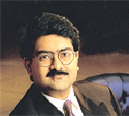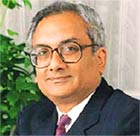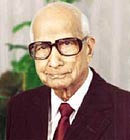Passion at work
29 August, 2005 | Hindustan Times
ShareBy Vir Sanghvi
Before we go any further, I have to declare an interest. The Hindustan Times is part of the K.K. Birla Group and Kumar Mangalam Birla is K.K. Birla's grand-nephew. Both men run their businesses separately and Kumar has nothing at all to do with the way in which the HT is run. But still there is a family connection and I think it's only fair to mention this straight out.
As far as I am concerned, there is also a second connection. Both Kumar and I are on the board of governors of the Birla Institute of Technology and Science (BITS) in Pilani. I was invited to join the board before the HT hired me and before Kumar became a governor, but for what it's worth, we do occupy places on the same board.
The point of the BITS connection is that it offered me a chance to see how people view Kumar. I had first met him some years before he turned up at the board meeting (I had also interviewed him on TV many years ago) but many of the others at the meeting —- faculty, alumni etc — had never been in the same room as him before.
When the chairman introduced him as a new governor, there were audible gasps from some of the alumni. "Is he the Kumar Birla?", somebody asked. And afterwards, people lined up to shake his hand.
 In Mumbai, for this interview, two years after that board meeting, I remind Kumar of the manner in which he was treated by the BITS people. Was he surprised / embarrassed / flattered by the reaction? After all, there are not many businessmen who would evoke this kind of response.
In Mumbai, for this interview, two years after that board meeting, I remind Kumar of the manner in which he was treated by the BITS people. Was he surprised / embarrassed / flattered by the reaction? After all, there are not many businessmen who would evoke this kind of response.
I don't remember how embarrassed Kumar seemed then but today he blushes a deep red and seems decidedly awkward. "Come on, it wasn't like that," he protests feebly. But, of course, it was. I remember the incident only too well, I tell him.
Besides, is it not true that when he goes to address functions at management institutes, he ends up signing dozens of autographs and having to pose for photographs with the students?
Kumar Birla is now very embarrassed.
Finally, he comes up with an explanation. "I don't remember the BITS incident," he says, "but I suppose that management students and young managers probably look up to me a little bit. But for the world at large, I don't think I am anything special. I don't think anyone even recognises me. I think I am quite anonymous."
Oh yeah?
Driven by passion
Several years ago when I interviewed Kumar for Star TV, he was already well known. He had appeared on Simi's programme and had been profiled extensively in the non-business press.
Despite that, he was extraordinarily diffident. For 15 minutes before we shot the first segment, he kept saying things like "What is there to ask me? Then, during the first break, he looked perturbed. "This is so boring," he said. I persevered and finished the interview.
That wasn't so bad, I said, finally. "Well, I thought it was very boring," he said. "Can we do it again?" And so, we re-shot the first two segments.
I didn't think there was much difference between the first shoot and the re-shoots but Kumar reckoned that he was much more relaxed the second time around. Even so, when the interview was finally over, he was back to saying things like "I don't know why you are interviewing me. Your guests are usually so interesting. I really don't have anything to say."
I remind him of the shoot and the re-shoots. Does he still think he is boring? I ask. "No, I don't think I am boring," he says with a surprising firmness. "I don't think I am boring at all." Does this mean that he has grown more interesting in the intervening period? Or has he just grown in confidence? Neither, apparently. "I never thought I was boring," he says.
And the re-shoots?
"I just wasn't sure that people would be that interested in me."
Make what you will of that distinction but Kumar is clear about what is boring and what is not. "I admit that I used to be petrified of TV," he concedes, "but I am very passionate about what I do. And I don't think passion can ever be boring. I find anybody who has a passion —- even if he is single-minded about that one passion — very interesting. So I don't know why you got the impression that I thought I was boring."
GenNext icon
 Even if Kumar Birla had been a mediocre businessman, he would still be one of the big hitters of Indian industry. His father Aditya Birla, was probably the greatest businessman of his generation, a true visionary who had the foresight and wisdom to professionalise his group and look for opportunities abroad. When Aditya died in 1995, the group was already worth Rs 8,000 crore.
Even if Kumar Birla had been a mediocre businessman, he would still be one of the big hitters of Indian industry. His father Aditya Birla, was probably the greatest businessman of his generation, a true visionary who had the foresight and wisdom to professionalise his group and look for opportunities abroad. When Aditya died in 1995, the group was already worth Rs 8,000 crore.
If Kumar had been content to manage the businesses that his father left him, and had not bothered with acquisitions or new projects, he would probably be sitting on a group that was worth around Rs 12,000 crore merely on the basis of normal growth. At that level, he would have been one of the country's leading businessmen.
Except, of course, that Kumar has not been content to just manage the legacy. He has transformed his father's empire, turned many of its business practices inside out and today his group has a market cap of over Rs 34,000 crore.
And he is just 38 years old.
Nobody I know is willing to predict what size his group will be by the time Kumar is 50. Of one thing however, everybody I speak to is absolutely sure: like his father before him, Kumar is the outstanding businessman of his generation.
Transforming the legacy
It needn't necessarily have turned out that way. In 1995, when Aditya Birla died at the age of 52, many people were not sure how the empire would fare without his masterly touch.
At the time, Kumar was only 28 and by common consent, too young to fill the shoes of India's greatest businessman. Moreover, Aditya was a charismatic figure and many of his senior managers were emotionally committed to his memory. "I remember that for the first few months there would be times when somebody would mention my father during a meeting and we would have senior Executives bursting into tears and leaving the room," says Kumar.
Many of these Executives had known Kumar as a child and he felt awkward telling them what to do or holding them accountable for their performance. Plus, there was his own sense that India was changing more rapidly than most people realised. In 1991, Manmohan Singh had begun the liberalisation process and many of the old cozy certainties that traditional families like the Birlas had grown up with were vanishing.
"I knew that we needed a transformation," Kumar recalls. "Not a cosmetic transformation but a fundamental change in the way in which we did things. My only question was: when? I was never sure whether I needed to wait before making the changes that I thought were necessary. The timing needed to be worked out carefully."
Eventually, of course, he found the right time. In the Birla Group, there was a womb-to-tomb policy. People rarely retired. And it was assumed that their children were guaranteed jobs with the group.
Kumar changed all that. "I felt that if people never retired, then there was no place for younger people to rise. So it was important to institute a retirement policy," he says. In real terms, this involved retiring 350 employees over the age of 60. As for the guaranteed jobs for family members, his view was "what used to happen was that if one son was very bright, he went to work for a multinational. The other son, if he wasn't good enough for anywhere else, was sent off to work for us. So I instituted a policy that vetted all applications from family members of existing employees. None of this made me very popular but I thought it needed to be done and now, I think people are much more accepting of the policy."
My father, my hero
Did it require guts to chart out his own course? To reverse policies set in motion by G.D. Birla and carried through by B.K.
Birla and Aditya Birla?
"It's an interesting thing about my family," says Kumar, "that while my elders were very conscious of certain values, they always encouraged us to make our own business decisions."
What kind of values?
"Simple things. The Birlas are very conscious about punctuality. We are not ostentatious. We have a great sense of family. I remember that during my vacations I would always go off to Calcutta to be with my grandparents. We are taught to respect older people. Good manners and regard for other people are considered very important."
Did he have much to do with G.D. Birla?
 "I was 15 when he passed away so I have quite clear memories of him. He would take a great interest in the little things that mattered to me. If I had an exam, then no matter where he was, he would phone and ask me how I had done. If I told him I was not going to have dinner because I was going out, he would want to know where I was going. If I said I was going to Sardar, he would want to know what that was, what pav bhaji was, that sort of thing."
"I was 15 when he passed away so I have quite clear memories of him. He would take a great interest in the little things that mattered to me. If I had an exam, then no matter where he was, he would phone and ask me how I had done. If I told him I was not going to have dinner because I was going out, he would want to know where I was going. If I said I was going to Sardar, he would want to know what that was, what pav bhaji was, that sort of thing."
What about his own father?
"I hero-worshipped him. Even though he was a very busy man and travelled a great deal, he was always there when I needed him. He came to every school function. He always made time for me. He knew who my friends were, he knew what I was doing. And because he was so good with people, he always knew how to get the best out of me. He could be tough as knuckles but he was tactful about it. He could be threatening, cajoling, soft, depending on what he thought I would respond to."
Was there a lot of pressure to live up to the legacy?
"In some ways, I was brought up in a pressure cooker environment. Though I was very close to my father and there was a strong bonding, I was also scared of him. But I trusted him implicitly. If he said something was right for me, I always did it. I remember when I had finished my ICSE, he phoned me and said that he had thought I should do my chartered accountancy simultaneously while I was doing my B.Com. The exam was only two weeks away and all my friends thought I was crazy. And yes, it was work, work, work. But I trusted my father's judgement and it never even occurred to me to say no."
Did he realise quite how obsessed his father was with him?
"No, why do you say that?" I tell him about the time I interviewed Aditya Birla in 1980 (or perhaps it was 1981) and he talked with great emotion about the time his son Kumar had fallen ill. The boy was 10 and the prognosis was not good. He had meningitis and the doctors were not sure if he would survive.
Aditya gave up his business, stopped going to office and sat every day by his son's bedside for nearly two months. "I said to myself that money, business, nothing else matters, I just want my son to get well," Aditya had recalled in his interview to me. He even took up painting as a means of relaxing and taking his mind off his son's health during this period.
Kumar has very vague memories of his illness. He says that he knows how Aditya reacted only because his father told him about it when he was older. But at the time, he had no understanding of how serious the illness was and how worried the family were.
"You know what it is like with kids," he smiles. "All I remember is that I missed school for two months." A pause. "But I still topped my class that year."
"I would still have been an entrepreneur. That's what I am. That's my passion. That's my whole life" When asked what would he have done if he had not inherited the Birla
Charting a new path
 Kumar says that he got involved in some small way in the family business when he was 15. "I remember being tutored by my father, sitting in on meetings and asking him questions afterwards. Later, I looked after the cement business of Grasim and got involved in Indo-Gulf.
Kumar says that he got involved in some small way in the family business when he was 15. "I remember being tutored by my father, sitting in on meetings and asking him questions afterwards. Later, I looked after the cement business of Grasim and got involved in Indo-Gulf.
"I was always taught to be independent. My father, his father and my great grandfather always made it clear to me that when it came to business, I had to take my own decisions and then take responsibility for them. Nobody tried to force me to do anything or made my decisions for me. At the time, this was tough but later, it stood me in good stead."
Kumar went off to London to study for an MBA when he was just 22, even though most of the other people in his class were 29. When he came back, he was uniquely qualified because he had studied chartered accountancy, had a commerce degree and an MBA. Plus, he had been tutored by the master: Aditya Birla.
Did anybody have any inkling, I wonder, that he would be pushed into the driving seat so soon?
 "No, we found out that my father was ill about two years before he passed away. And though nobody said anything in so many words, I felt that once he knew, he made a conscious attempt to fast-track me in a very matter of fact sort of way," he says. "But I'll tell you something: even though we knew how unwell he was, it never ever occurred to me that there was a time that he wouldn't be there."
"No, we found out that my father was ill about two years before he passed away. And though nobody said anything in so many words, I felt that once he knew, he made a conscious attempt to fast-track me in a very matter of fact sort of way," he says. "But I'll tell you something: even though we knew how unwell he was, it never ever occurred to me that there was a time that he wouldn't be there."
Never? Even though he knew his father had cancer?
"No, never. I met my father on the morning of the day he passed away. And I had no idea that by the end of the day he would not be there. It just never entered my mind."
Later, when he was making all those changes in the way the group was run, did he wonder how his father would have reacted?
"I think many of the changes were a response to the changed environment. But I was always brought up to make my own decisions. I was never required to think `what would my father do?' As much as I hero-worshipped him, we have different styles."
Such as?
"I think he was more hands on. My style is much more to give people freedom to do their own thing. As long as they deliver, I don't like to get involved. They should have the freedom to do what they think necessary. I am available if they need me and I will hold them accountable but I will not interfere needlessly."
Wasn't this a huge change for the group?
"Yes, it was. People used to say that when Aditya babu phoned somebody, then that person would stand up while answering the phone. He was great at bilateral motivation and contact. My style is more group-oriented. I like motivating groups of people. I find that in business, it is more important to empower a whole group than to depend on a single individual. So in that sense, my approach is less bound by the baggage of tradition."
He has done things that the Birlas have rarely done before. He has grown, for instance, through acquisition, a change of approach for the family. He has branched out into consumer products while the family fortune has really been founded on commodities.
"Yes, that's true. We still have a very strong presence in the commodities sector and I am very comfortable with that. But I see our group as a conglomerate. I am not a great believer in core competence. I am quite happy being involved in a variety of businesses, provided I am sure that we can attain a leadership position in those businesses. So you'll find us now in mutual funds, insurance and branded garments. In fact, we're the market leaders in the branded garment business."
Passion is the key
 The group's corporate logo symbolises integrity, quality and characterThe other thing he's done, of course, is that he's c;reated a brand within a brand. Every Indian has heard of the Tatas and the Birlas. But while the Tatas have been content to strengthen their original reputation, Kumar has c;reated a sub-brand within the Birla image: the Aditya Birla Group with its distinctive logo. Many young people, I tell him, now think of the sun when you mention the Birlas, not recognising that it is the logo of just one part of the whole family.
The group's corporate logo symbolises integrity, quality and characterThe other thing he's done, of course, is that he's c;reated a brand within a brand. Every Indian has heard of the Tatas and the Birlas. But while the Tatas have been content to strengthen their original reputation, Kumar has c;reated a sub-brand within the Birla image: the Aditya Birla Group with its distinctive logo. Many young people, I tell him, now think of the sun when you mention the Birlas, not recognising that it is the logo of just one part of the whole family.
In the process, he has become one of India's most respected businessmen. While many of the traditional bania families are seen as being too old economy or as being creations of the license quota permit raj, he has led a Birla renaissance. Even people who are unaware of G.D. Birla's friendship with Mahatma Gandhi or of the Birla family's role in India's independence struggle, will look up to Kumar Birla as epitomising the best qualities of Indian business.
Kumar does not agree. He does not believe that he is treated any differently from any other member of his family or that his Aditya Birla Group now has a reputation for integrity and excellence that is matched only by the Tatas and the Bangalore IT companies.
Why c;reate a sub-brand then? I ask.
"It started out as an internal touch-point. I wanted to capture certain values that I wanted the group to embody: youth, dynamism, trust, tradition, modernity, growth and quality. These are the values that I strive for and I wanted some way of embodying them."
But surely, the youth bit is his contribution? The Birlas are an old family. He is the young element in that brand image?
"Perhaps. But a brand is not about individuals. Whatever it stands for is really a tribute to the team we have c;reated..."
Sensing that he is about to go all modest on me again, I ask him about his destiny. Supposing his surname had not been Birla; suppose he did not inherit this Rs 8,000 crore empire; what would Kumar Birla have done then?
"The same thing. Though perhaps without all these advantages. I would still have been an entrepreneur."
So that's how he sees himself ? Not as a captain of industry? Not as a great manager? But as a simple entrepreneur?
"Oh yes. That's what I am. I am an entrepreneur."
And he enjoys that?
"Yes. That is my passion. That is my whole life." And with so much passion in him, how could I have ever made the mistake of believing that he worries about being boring?






